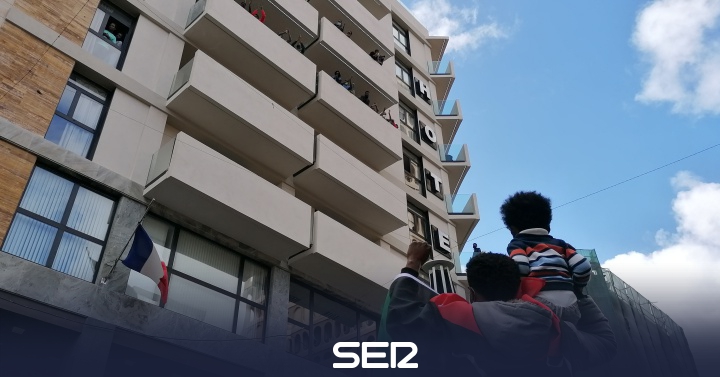Las Raices is cold and far from the city, those who are there know that they will not be served as in the hotels, although they will not lack a roof and food. This is how he faces a Red Cross worker employees in those establishments that welcome migrants since the summer in Tenerife the doubts of all of them on a daily basis.
Judith -fictitious name- was hired by the humanitarian organization to carry out work of support and assistance to migrants in one of the hotels in Tenerife, although the theory is far from the role it plays in practice.
“I cannot perform the functions that are within my competence“Judith says in a recorded conversation last week where she also regrets that he cannot teach Spanish or carry out activities outside the centers: “there is such a strong deficit of other administrative, social and medical needs that we cannot really contribute to where we are”.
The pressure from reception centers increases not only among migrants “who have learned to live together despite cultural clashes between them”, but also with employees. “We are four per shift to assist more than three hundred people“says Judith, among whom is a coordinator who assumes the functions of legal, psychological and contact assistance with their families during a nine-hour working day.
The humanitarian organization “is overloading the work professionals and trying to get volunteers to help“she says indignantly because she believes that, even though they” have other abilities, “she warns that”They are not the right profiles for the situation we are facing“.
Doubts about The Roots
Those who still remain in the hotels fear reaching the Las Raices camp. They believe that it is the step prior to the return to their countries of origin. There they do not have so many plugs and no Wi-Fi so the difficulties in communicating with their families increase exponentially and they know all that.
“They ask who is working there because many have built trust with employees and some colleagues. They feel safer, “says this professional who regrets that mistrust is also increasing more and more:” We had a transfer of people who were going to Las Raices and the fear of going to the street has increased; there is a very large information failure because they are afraid“Judith laments.
In hotel establishments where migrants are still welcomed, they share a room with between two and four people. Some of those who have wanted to speak agree that they are comfortable and the food is good and they believe that their conditions in the camp located in La Laguna will mean a turn in the opposite direction so far.
In fact, some of them have given up on hotel reception. It is only a matter of one procedure: they sign the express resignation or, simply, they disappear and they don’t come back that way. “Some are lucky enough to have a friend or family member that welcomes them, “says Judith, although they try to make them clear about the dangers to which they are exposed by staying on the street. They say they prefer it” to going to Las Raices because they think the next step is to return.
Minors in hotels
“No, not at all,” said Judith without hesitation when asked if all those who remain in the hotel are of legal age. And this is the other great element of tension. “They tell us that they do not understand why they are told that they are of legal age“, affirms this worker of the establishment. After the bone tests carried out, the report determines the age of a migrant person. Some claim to be minors and prove it with their documentation, but it’s not always enough.
“We prepare reports with interviews where we determine their needs, their level of schooling or whether or not they have a family, “says Judith.”These studies do not take us into account“to adjust for age determined by bone tests that have a margin of error.”
–


